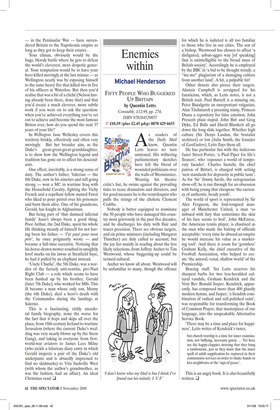Enemies within
Michael Henderson
FIFTY PEOPLE WHO BUGGERED UP BRITAIN by Quentin Letts Constable, £12.99, pp. 274, ISBN 978184529855 ✆ £10.39 (plus £2.45 p&p) 0870 429 6655 As readers of the Daily Mail know, Quentin Letts leaves no turn unstoned. His withering parliamentary sketches have left the blood of wounded politicians over the walls of Westminster. Wearing his theatre critic’s hat, he swims against the prevailing tides to tease dramatists and directors, and for good measure he is the ventriloquist who pulls the strings of the choleric Clement Crabbe.
Nobody is better equipped to nominate the 50 people who have damaged this country most grievously in the past five decades, and he discharges his duty with flair and tracer precision. There are obvious targets, and six prime ministers (including Margaret Thatcher) are duly called to account; but the joy lies mainly in reading about the less likely selections, from Jeffrey Archer to Tim Westwood, whose buggering-up could be termed cultural.
Archer we know all about. Westwood will be unfamiliar to many, though the offence for which he is indicted is all too familiar to those who live in our cities. The son of a bishop, Westwood has chosen to affect ‘a disfigured, urban-aggro way [of speaking] that is unintelligible to the broad mass of British society’. Accordingly he is employed by the BBC in ‘a bid to be thought trendy, a “me-me” plagiarism of a damaging culture from another land’. A hit, a palpable hit!
Other thrusts also pierce their targets. Alastair Campbell is arraigned for his fanaticism, which, as Letts notes, is not a British trait. Paul Burrell is a mincing rat, Peter Bazalgette an unrepentant vulgarian, Alan Titchmarsh a preening ninny, Princess Diana a repository for false emotion, John Prescott plain stupid. John Birt and Greg Dyke, Ed Balls and David Blunkett all go down the long slide together. Whether high culture (Sir Denys Lasdun, the brutalist architect) or low (Julia Smith, the founder of EastEnders), Letts flays them all.
He has particular fun with the ludicrous Janet Street-Porter, ‘a Pied Piper for life’s floaters’, who ‘espouses a world of temporary facades’. Charles Saatchi, the chief patron of Britart, is charged with setting ‘new standards for depravity in public taste’. As for ‘Sir’ Jimmy Savile, the octogenarian show-off, he is run through for an obsession with being young that cheapens ‘the currency of authentic, heady youth’.
The world of sport is represented by Sir Alex Ferguson, the foul-tongued manager of Manchester United, a man ‘so imbued with fury that sometimes the skin of his face seems to boil’. John McEnroe, the American tennis player, is chastised as the man who made the baiting of officials acceptable: ‘every time he abused an umpire he would increase his value as a marketing tool’. And there is room for ‘gormless’ Graham Kelly, the chief executive of the Football Association, who helped to create ‘the amoral, venal, shallow world’ of the Premiership.
Bracing stuff. Yet Letts reserves his sharpest barbs for two less-heralded cultural vandals, Graham Kendrick and the Very Rev Ronald Jasper. Kendrick, apparently, has composed more than 400 ghastly modern hymns, and Jasper, ‘a fiendish combination of radical and self-polished saint’, was responsible for transforming the Book of Common Prayer, that masterpiece of our language, into the unspeakable Alternative Service Book.
‘There may be a time and place for happiness’, Letts writes of Kendrick’s tunes,
but church worship is a time for inner examination, not bullying, incessant gaiety ... Yet here are the happy-clappies insisting that they bang a tambourine, just as they insist that the inner spell of adult supplication be ruptured in their communion services in order to shake hands or kiss neighbours at the ‘sign of peace’.
This is an angry book. It is also beautifully written. ❑


















































































 Previous page
Previous page